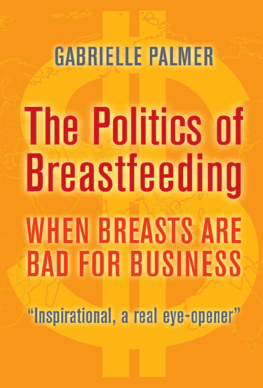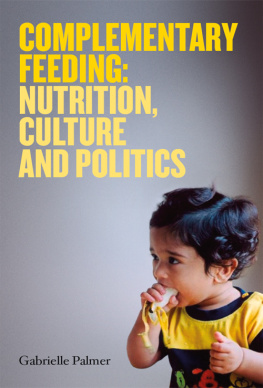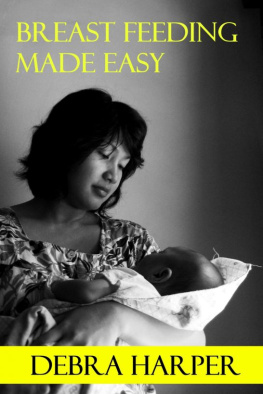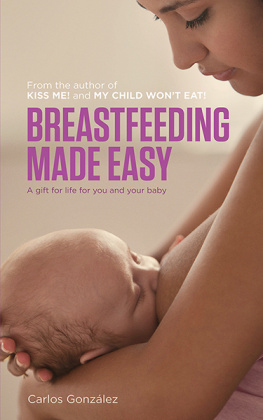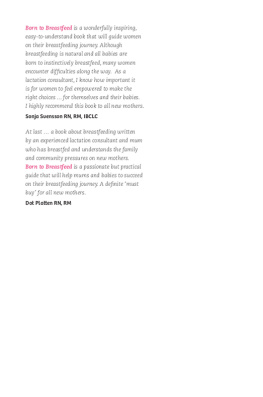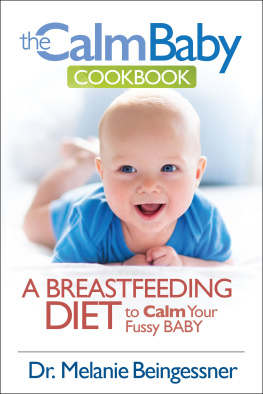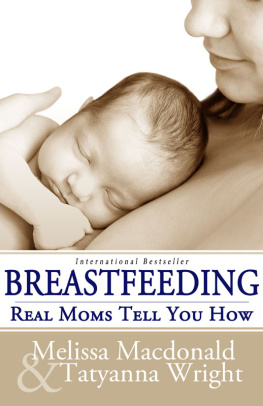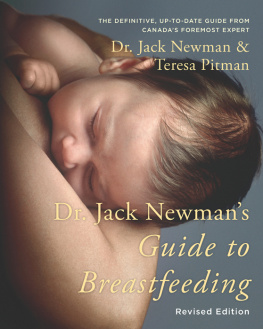The Politics of
Breastfeeding
to my family
Gabrielle Palmer is a nutritionist and a campaigner. She was a breastfeeding counsellor in the 1970s and helped establish the UK pressure group Baby Milk Action. In the early 1980s she worked as a volunteer in Mozambique. She has written, taught and campaigned on infant feeding issues, particularly the unethical marketing of baby foods. In the 1990s she co-directed the International Breastfeeding: Practice and Policy Course at The Institute of Child Health in London until she went to live in China for two years.
She has worked independently for various health and development agencies, including serving as HIV and Infant Feeding Officer for UNICEF New York. She recently worked at The London School of Hygiene and Tropical Medicine where she had originally studied nutrition.
She is a mother and a grandmother.
The Politics of Breastfeeding
WHEN BREASTS ARE
BAD FOR BUSINESS
GABRIELLE PALMER
PINTER & MARTIN
The Politics of Breastfeeding
When breasts are bad for business
First published by Pandora Press 1988
This third updated and revised edition
first published by Pinter & Martin Ltd 2009, reprinted 2009, 2011
This ebook edition first published 2011
All rights reserved
2009 Gabrielle Palmer
Gabrielle Palmer has asserted her moral right to be identified as the author of this work in accordance with the Copyright, Designs and Patents Act of 1988.
ISBN 978-1-905177-74-5
British Library Cataloguing-in-Publication Data
A catalogue record for this book is available from the British Library.
This ebook is sold subject to the condition that it shall not, by way of trade and otherwise, be copied, reproduced, transferred, distributed, leased, lent, resold, hired out, or otherwise circulated without the publishers prior consent. Any unauthorised distribution or use of this text may be direct infringement of the authors and publishers rights.
Pinter & Martin Ltd
6 Effra Parade
London SW2 1PS
www.pinterandmartin.com
contents
illustrations
1 Hanging upside down in caves cartoon
2 Exploiting ignorance: Cow & Gate leaflet 2006
3 Woman bottle-feeding in Costa Rican maternity ward
4 Notice forbidding mothers contact with their newborns
5 Mother and baby in KMC Unit
6 Nurses bottle-feeding newborns in Singapore ward
7 Woman sleeping with her newborn in hospital bed
8 Mum just let Dad give me a bottle cartoon
9 Paternal bliss: Stephen Clark with his son Lewis
10 Baby being fostered after Mynamar cyclone
11 Collecting water, Niger
12 Cooking the family meal, Ethiopia
13 A river may serve as an open sewer, Sierra Leone
14 Egyptian woman breastfeeding her baby in the street
15 Our terror of babies cartoon
16 Why you cant be a mother and PM cartoon
17 Oversized aristocratic family, including deceased infants
18 Mummified infant from Xinjiang Region, China
19 Advertisement for Bordens Condensed Milk
20 Glaxo advertisement 1917
21 Highly complicated formula used in infant feeding
22 Advertisement for Nestls Food, 1912
23 La Maternit, Nestl advertisement, 1935
24 Baby in fancy dress at 1945 Victory party
25 Empire Marketing Board Poster
26 Cow & Gate advertisement published in 1940s/50s UK
27 Nestl milk nurses in South Africa, 1950s
28 Graphic of baby in bottle for The Baby Killer, 1974
29 Bear Brand Coffee Creamer label, 2008
30 Milupa advertisement promoting follow-on milk
31 Philippines product labels with misleading claims
32 Brazilian parents with triplets
33 Millennium dollar coin
34 Ethiopian mother and her baby
35 Mongolian mother suckling her premature twins
36 Mother and baby breastfeed their own way
preface to the third edition
I wish I were not writing this preface. There should be no need for this book. In a world beset by overwhelming problems, here is a resolvable issue. Twenty years ago when I was writing the first edition, more than three thousand babies were dying every day from infections triggered by lack of breastfeeding and by the use of bottles, artificial milks and other risky products. This is still happening.
In the first and second editions I described the pressures on women, on health workers and on governments. I wrote about the culture of artificial feeding and the collusion between the baby food companies and the medical, nutritional and healthcare establishments. They have all promoted products and practices which have contributed to the suffering, illness and death of millions of babies and often their mothers too. This is still happening.
This third edition is necessary because some things have changed. Scientific research has revealed more amazing facts about breastfeeding. It is now known that even in a rich country, a millionaires baby who is artificially fed is less healthy than the exclusively breastfed baby of the most disadvantaged mother. Long term health problems such as high blood pressure and diabetes are influenced by how babies are fed, and breastfeeding women reduce their own risk of breast cancer. Better understanding of womens bodies shows how adaptable they are and what a resilient process breastfeeding is when it is not sabotaged from the start.
Knowledge serves no purpose if it is not spread around. As the poor get poorer and the rich get richer, an entrenched ignorance is kept in place through a culture created and maintained by commercial interests. This new edition shows how the baby food and bottle companies use ever more aggressive promotion. Challenged by the new evidence, they work harder and pour more resources into more sophisticated marketing strategies; they manipulate the media, influence governments policies and infiltrate the very agencies that are supposed to protect health.
Those who work to combat these influences have become more skilled, but progress is undermined by widespread misinformation and lack of awareness. I am so impressed by the talents of groups who struggle for human welfare: the women who support each other, the campaigners and those health workers who strive to cure their colleagues of the nonsense they learn from outdated training and text books and misleading promotional information. This book is not written for mothers, but for everyone; man or woman, parent or childless, old or young, because this issue concerns us all. I have added some facts and updated others, but the main theme remains unchanged. I hope that this will be my last preface and that this book will become merely the record of a tragically foolish phase in human history.
why breastfeeding is political
From politics it was an easy step to silence.
Jane Austen, Northanger Abbey, 1818
If a multinational company developed a product that was a nutritionally balanced and delicious food, a wonder drug that both prevented and treated disease, cost almost nothing to produce and could be delivered in quantities controlled by consumers needs, the announcement of this find would send its shares rocketing to the top of the stock market. The scientists who developed the product would win prizes and the wealth and influence of everyone involved would increase dramatically. Women have been producing such a miraculous substance, breastmilk, since the beginning of human existence, yet they form the least wealthy and the least powerful half of humanity.

